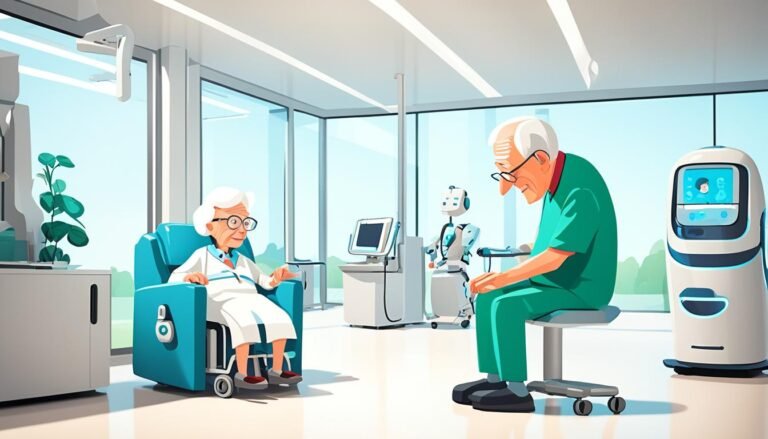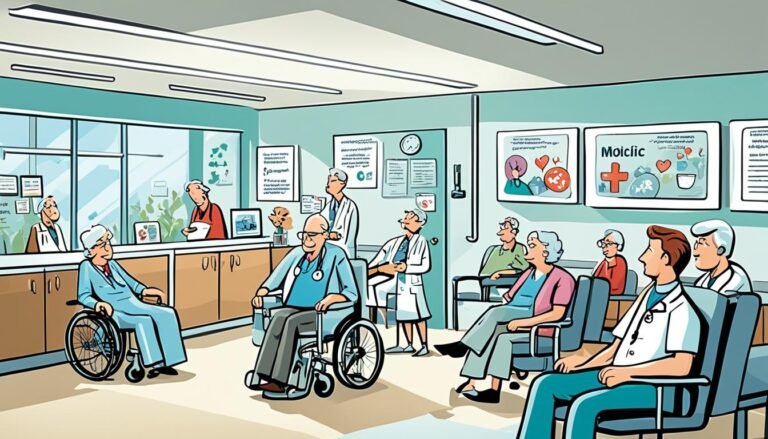Health Data Interoperability: Challenges and Solutions in Ireland
Did you know that up to 30% of Ireland’s healthcare budget goes to managing data? This shows how big a role healthcare data plays in the country’s health system. Even with tech advances, much health data in Ireland is still not connected, affecting data quality and value. Improving health data sharing is key to better patient care, faster diagnoses, and fewer unnecessary tests.
Health data sharing is more than just sending data around. It leads to new ideas and makes tasks like booking appointments and billing easier. This reduces mistakes and helps doctors work less hard. But, making data sharing work in Ireland faces big hurdles like tight budgets, resistance to sharing data, and no common way to share data yet.
It’s vital to understand these challenges and find ways to overcome them. This article looks at the issues and offers solutions for better health data sharing in Ireland.
Key Takeaways
- Health data interoperability is key to better patient care and lower healthcare costs.
- Budget issues and not wanting to share data are big hurdles to interoperability in Ireland.
- Standardizing data sharing methods like FHIR and HL7 is crucial for interoperability.
- Ireland needs to invest in better health data systems to meet EU standards.
- Using Electronic Health Records (EHRs) can improve care and make sharing data smoother.
Introduction to Health Data Interoperability
Health data interoperability means different healthcare systems can share and understand each other’s data. In Ireland, making healthcare work better across different places is a big goal.
Making health data work together can make healthcare better. By using data warehouses and data lakes, we can make sure data is clean and shared well. This helps avoid problems and makes working together easier.
Since 2013, Ireland has been working on making health data shareable. The goal is to improve digital health services and make care better by sharing data.
Other countries like France and Germany are also working hard on this. They’re making laws and plans to make health data shareable. This is important for using artificial intelligence in healthcare.
EU universities are also getting involved. For example, Dublin City University is working on new ways to teach about sharing data. They’re making resources to help with this big challenge.
So, making health data shareable takes a lot of work from many people. We need to use new tech and ways of sharing data to make healthcare better and more efficient.
The Importance of Interoperability in Healthcare
Health data sharing is key for efficient healthcare delivery. It helps reduce information gaps and gives quick access to patient data. The 2016 Cures Act’s rules on info blocking can fine healthcare providers up to $1 million. This pushes them to use interoperability.
Sharing data well through interoperability helps doctors make better decisions. This leads to enhanced patient outcomes and tailored treatments. John Hopkins Medicine in Baltimore says 795,000 Americans each year suffer disabilities or die from medical mistakes. Interoperability can greatly lower these risks.
There are three levels of interoperability needed for data to move smoothly between systems. Foundational interoperability lets systems share data first. Structural interoperability sets a standard for data exchange, keeping its original meaning. Semantic interoperability makes sure systems understand the data correctly with standard vocabularies.
In Ireland, not having interoperability means poor records, repeating tests, and broken information systems. About 30% of the health budget might go to managing information. With interoperability, these issues and costs can drop, saving money for healthcare and patients.
Enhanced patient outcomes come from less doctor burnout, as they spend less time on paperwork and more on patients. Efficient healthcare delivery also means sharing sensitive data safely, making patients’ experiences better.
Interoperability is key for sharing health data and tracking diseases. In Ireland, creating a strong health info system is crucial. The Health Information and Quality Authority is working on standards for better service planning and monitoring.
Challenges in Health Data Interoperability in Ireland
Health data sharing in Ireland faces big challenges. These include problems with data management, not wanting to share data, limited budgets, and no standardization. These issues make it hard to share and combine health data smoothly.
Data Management Issues
Ireland’s healthcare system has trouble managing its data. Information is spread out on many platforms. This makes it hard to use data well and creates problems for integrated health systems.
Poor data management leads to too much data and mistakes. This makes it tough for doctors to get the right patient info on time.
Resistance to Data Sharing
Many people don’t want to share data. This data sharing resistance comes from hospitals and clinics competing with each other. They see data as their own. This stops them from working together and building a unified health info system.
Trust is key to get past these issues. We need a culture that sees sharing data as a good thing.
Budget Constraints
Not enough money makes it hard to improve systems and train staff. Healthcare budgets are tight, so spending on new upgrades and training is hard. This stops some places from moving to better systems that can handle modern data sharing.
Lack of Standardization
Not having standardization in healthcare IT is a big problem. Many places use old or custom EHR systems. This makes it hard to use new data standards like FHIR and HL7.
Without a common data language, sharing data across different places is hard. It’s important to bring current systems up to date with new standards for better data sharing and integration.
Impacts of Non-Interoperability in the Irish Health System
Non-interoperability in the Irish health system causes big problems. It affects health system efficiency, patient data access, and healthcare quality. Without connected systems, patient care varies a lot. Health workers spend too much time finding information that could be easier to get with an interoperable system.
From May to November 2020, over 50 people were interviewed and workshops were held. They looked at Ireland’s health information system (HIS). They found big gaps in data, especially in primary care and community care. Not having easy access to electronic health records means patients get tested too much and healthcare costs go up.
Barriers in administration and operations make it hard to get patient data access. Patients often have to give the same info over and over because of separate systems. This hurts healthcare quality and makes patients unhappy. Ireland’s health sector lacks a strong ICT infrastructure, making sharing information safely and well hard.
In 2017, the Sláintecare health reform started to fix some of these problems. But, more work is needed to improve the HIS. Interviews in 2020 showed that having people from the Health Service Executive, Department of Health, and others involved is key to making change.
The lack of interoperability in Ireland holds back the use of medical research and innovation. A unified and integrated approach is needed to get better health outcomes and improve the health system.
Solutions to Overcome Interoperability Challenges
To solve health data interoperability issues in Ireland, we need both strategic and technical solutions. These solutions ensure smooth data sharing, improve services, and keep healthcare data safe and private.
Adoption of Data Standards
Using global data standards is key for Data Standards Adoption. Standard formats make sharing health data easy across different systems. The Health and Human Services (HHS) goal to reach plug-and-play interoperability by 2024 shows how important this is.
By following international standards, healthcare providers can avoid data problems like mismatches and duplicates.
Leveraging Interoperability Frameworks
Comprehensive Interoperability Frameworks help healthcare places work together better. They make sharing data smoother. For example, custom APIs bring together data from different Electronic Health Records (EHR) systems into one place.
This makes it easier to make decisions and access information.
Improving Information Governance
Good Information Governance is crucial for handling health data well. Strong frameworks tackle data quality issues, making data accurate and useful. Standard policies and data management plans help handle different data sources and old systems.
This also helps follow privacy and security rules, keeping patients trusting their healthcare providers.
Ensuring Privacy and Security
Protecting patient data is a must in healthcare today. We need to use strong privacy and security steps for data sharing. This includes strict privacy rules, secure encryption, and careful access control.
These steps protect patient info and help share health data safely among providers. This reduces the risks of data breaches and mistakes.
Role of Electronic Health Records (EHRs) in Promoting Interoperability
EHRs are key to making healthcare systems work together better. In Ireland, using EHRs with other systems and making data more accurate is crucial. This helps create a unified healthcare IT system. EHRs make sharing patient data easy, which helps doctors make better treatment plans.
Integration with Existing Systems
It’s important to connect EHRs with current systems for full sharing of data. This lets doctors see a patient’s full health history, no matter where it was recorded. Making EHRs work better with others means patients’ health records can move easily between doctors or specialists, improving care.
EHRs also automatically track important health info, like medicines given. This saves time and cuts down on mistakes, making data more reliable. Plus, it means doctors everywhere can see a patient’s info, no matter where they are.
Enhancing Data Accuracy and Availability
Having accurate and easy-to-get EHR data is key for good healthcare. In Ireland, most doctors see EHRs as a big help, especially in mental health care (Kariotis TC, Harris KM. Aust J Prim Health. 2019). Right data in EHRs helps doctors make better choices, which helps patients get better care. Having the same data everywhere means doctors always have the latest info for their patients.
Fixing issues like hard-to-use interfaces and lacking support can make EHRs better. For instance, most healthcare workers say EHRs work well for primary care (Krist AH et al. J Am Med Inform Assoc. 2014). Making these systems better means better data entry, checking, and getting information, which helps everyone work together better.
By working on EHRs and making data more accurate, Ireland’s healthcare can get better at sharing info. A strong EHR system will make things run smoother and help give patients better care and health results all over the country.
Case Studies on Health Data Interoperability in Ireland
Looking into Irish Healthcare Case Studies shows us how hard it can be to make healthcare systems work together. We see both the good and the bad. These stories tell us how groups have tackled the tough parts of making data sharing work. They show how this has led to better patient care and smoother healthcare work.
A big example is the work between the Health Service Executive (HSE) and many hospitals in Ireland. A 2021 Google Cloud survey found that 91% of doctors said it’s key to use patient data well in care plans. This helps doctors work better together. The HITECH Act gave $27 billion to help get EHR systems in place.
But, it wasn’t easy. The same survey said 92% of doctors felt bad EHR systems hurt their ability to give good care. Still, the HSE’s projects show a strong effort to get past these problems. In fact, 86% of doctors said better sharing of data helps make diagnoses faster.
Looking at primary care, we see how working together has made a big difference. These stories show how using existing tools and making data standards work has helped. This has led to better patient care and more efficient healthcare.
These stories also show us big picture benefits. Cutting down on waste can save money and help manage resources better. For example, not sharing healthcare data costs the U.S. health system over $30 billion a year. This shows the big financial hit of not having connected data systems.
In short, these Irish Healthcare Case Studies give a roadmap for others wanting to improve EHR systems through better sharing of data. By looking at real-life examples, we can learn a lot. This helps us know what works best for a fully connected healthcare system.
European Initiatives and Their Implications for Ireland
The European Health Data Space (EHDS) is key in the EU’s healthcare plan. It aims to make sharing health data safe and standard. This will give patients more control over their health data and boost innovation in the EU. For Ireland, joining these efforts is vital for its digital healthcare growth.
European Health Data Space (EHDS)
The EHDS plan gives citizens more control over their health data. If it passes, it could start in 2025, changing healthcare systems for the better. Ireland’s healthcare is currently not well connected, so it needs to change to follow the EU’s lead. Investing in digital tools and big data platforms is a must. Also, solving the IT recruitment freeze in the HSE is key to making these changes work.
Big pharma and MedTech companies in Ireland will gain from the EHDS. They will get better data access and can work together more easily.
eHealth Digital Service Infrastructure (eHDSI)
The eHealth Digital Service Infrastructure (eHDSI) supports healthcare across borders and data sharing. For Ireland, it means making national policies work better with eHDSI. This means speeding up the use of electronic health records, making a national health data strategy, using EU funds, and standardizing data.
Learning from other European countries on health data could help Ireland with eHDSI. The European Parliament adopted the EHDS Regulation in April 2024. It’s expected to start in Autumn 2024. This shows how urgent it is for Ireland to match its health data with EU standards.
Working with the EHDS and eHDSI will lead to better healthcare, more innovation, and stronger EU collaboration. These steps will also fix the past issues between Ireland’s health and finance departments. By taking part in these European Health Initiatives, Ireland can greatly improve its digital health setup. This will lead to better care for patients and healthcare workers.
The Role of MedTech in Enhancing Data Interoperability
The MedTech industry in Ireland is key to improving health data sharing. It does this through new MedTech Innovations and Data Platform Development. Yet, many Irish MedTech companies struggle with sharing data smoothly. About 14% of them had big problems because they didn’t focus on sharing data early on. This shows how important it is to think about health data rules from the start.
Innovation in Data Platforms
Creating new data platforms is vital for sharing data well. Right now, 36% of Irish MedTech companies lack the skills needed for full data sharing. Also, 28% have platforms that don’t meet health data standards. A unified platform is needed for better connectivity and managing data. About 32% of Irish MedTech firms are using or planning to use such platforms to improve their data sharing.
Compliance with Regulatory Standards
Following health data rules is crucial for sharing data well. Companies must make sure their new ideas meet global health data laws. This can be hard. Companies like Boston Scientific and Johnson & Johnson’s Janssen Sciences are focusing on renewable energy and sustainable practices. This shows a move towards following more rules, not just for data sharing.
More than two in five (42%) of Irish MedTech companies use or plan to use database management systems. This helps with handling data better and following rules. This focus not only keeps data sharing in line with rules but also makes it more reliable and trustworthy.
Source Links
- Top Healthcare Interoperability Challenges – Excellarate
- The European Health Data Space and it’s Implications for Ireland.
- An Analysis of Demographic Data in Irish Healthcare Domain to Support Semantic Uplift
- A micro credential for interoperability
- European Health Data Space will enable health innovation through secure data sharing | Amazon Web Services
- Interoperability in Healthcare – Main Challenges📍
- Overview of Healthcare Interoperability Standards
- WHO launches new network for advancing data and digital solutions for health
- Interoperability in health and social care: organisational issues are the biggest challenge
- Status of the health information system in Ireland and its fitness to support health system performance assessment: a multimethod assessment based on stakeholder involvement
- Developing eHealth Interoperability Standards for Ireland
- Overcoming Challenges to Interoperability White Paper
- How to Solve Healthcare’s EHR Interoperability Problems
- What is Data Interoperability? – Reltio
- Impact of Electronic Health Records on Information Practices in Mental Health Contexts: Scoping Review
- Improving the Quality and Utility of Electronic Health Record Data through Ontologies
- Interoperability | Datavant
- Gaps to Gateways With TEFCA Clinical Trial Data Integration
- ‘Cultural change’ needed in Ireland to harness health data
- The European Health Data Space
- Bridging the data gap is vital for Irish medtech companies
- Irish Medtech Sector Aims to Make Sense of Data in 2023 –








